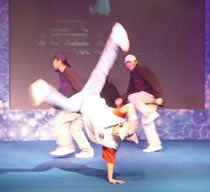Cashing In
These days, breakdancing can be seen everywhere. From the street corner to the television screen, there is no denying its sudden popularity. Breakdancing competitions are now held regularly in cities around China. Last year, the country held its first annual TV breakdancing championship, where individuals as well as teams from all over the country competed in front of a national audience.

Not surprisingly, it didn't take long for someone to spy a lucrative business opportunity. Enter the Northern Gang of Hip Hop Co., Ltd. What started out as a group of young students and street performers eventually became a growing hip-hop and breakdancing company, whose members have performed on 15 separate occasions at home and abroad since January this year.
"In the beginning, it was just a dance group, without any formal management," says Cui Wendou, the group's spokesperson. "They were better breakdancers than most, even though for them it was just a hobby." In 2002, the group was organized into a more formal troupe and began performing around Beijing. All money earned went towards building an office and small practice space.
What makes Northern Gang of Hip Hop unique in the development of breakdancing in China is that for these young dancers, it's a professional commitment. NGHH members have no other work. Their dance skills literally pay the bills.
We've got members who've been dancing since they were small. We've got middle school students, high school students, college drop-outs; but all of them, by making money through dancing, have watched their hobby turn into a profession," explains Cui.
Three times a week NGHH dancers come to their small office in northeast Beijing to practice their routines with other team members. While the dancers challenge each other in the practice space, on the other side of the door, an office bustles with activity as gigs are made and lost. Though their product was initially unique, these days there is fierce competition. When the dancers are asked if they do regular shows, theyrespond that all shows are decided by the company and "there is no set schedule."
And yet, when NGHH moved off the streets and into the corporate world, they began drawing a lot of heat. Fellow breakedancers complained that they were too commercialized. Like the commercialization of any cultural product, there is the risk that the original art form could be replaced by a watered-down version that is pre-packaged for easy consumption by the masses. Indeed, hip-hop originated in part as a response to the commodification of disco and funk. In China, it appears as though the process has already begun.
![]() 北京市通信公司提供网络带宽
北京市通信公司提供网络带宽
